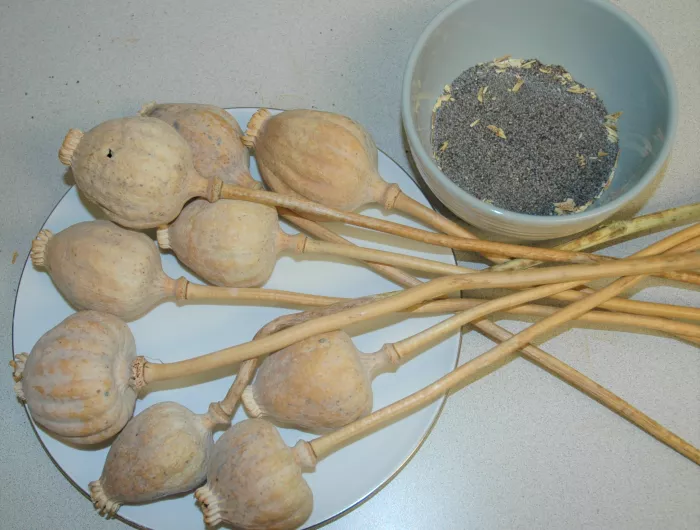CSPI urges FDA, DEA to crack down on sale of contaminated poppy seeds

At least 12 U.S. deaths are associated with ‘tea’ made with poppy seeds or pods
The Center for Science in the Public Interest today is calling on the Food and Drug Administration and the Drug Enforcement Administration to crack down on the sale of contaminated poppy seeds and seed pods in the wake of at least 12 American deaths.
The nonprofit food and health watchdog asked officials at the agencies to jointly clarify that it is illegal to import and distribute contaminated poppy seeds and that those who do are subject to federal prosecution. Also today, Senator Tom Cotton (R-AR) intends to introduce new legislation, the Stephen Hacala Poppy Seed Safety Act, to amend the law to ensure that contaminated poppy seeds may not be sold to consumers.
Opiates such as morphine and codeine occur naturally in the opium poppy, which is why its cultivation is prohibited in the United States. The DEA lists “poppy straw”—all parts of the poppy plant other than the seeds—as a Schedule II controlled substance. While the sale and importation of poppy seeds is legal, seeds can become contaminated by poppy straw and sap in the fields and during processing. Importation of contaminated poppy seeds is illegal. Opiate contamination can be brought down to safe levels by washing and drying the seeds. Nevertheless, potentially contaminated poppy seeds are widely available at several online retailers, including Amazon.com and Ebay. Recipes for poppy seed “teas” abound on web sites such as Mercola.com and Chewworld.com.
“Poppy seed teas are responsible for numerous cases of addiction, overdose, and death,” said CSPI president Dr. Peter G. Lurie. “This little-known aspect of the opioid epidemic does appear to be worsening in terms of its toll. The FDA and the Department of Justice are aware of the problem but have failed to fully exercise their authorities.”
Stephen P. Hacala, a 24-year-old Arkansas man, died after drinking tea made from contaminated poppy seeds purchased on Amazon.com in 2016, prompting Arkansas Attorney General Leslie Rutledge (R) to contact the FDA and prompting Senator Cotton to ask then-Attorney General Jeff Sessions and DEA Acting Administrator Uttam Dhillon to stop the products’ sale. Hacala’s parents, Steve and Betty Hacala, are in Washington today meeting officials at FDA for the second time.
“Our family is still in shock over the death of our son Stephen from consuming morphine-laced poppy seeds,” said Betty Hacala. “We have been working tirelessly since his death to raise awareness and drive change so that other families don’t have to suffer as we have. We implore the FDA and DEA to act now.”
Mr. Hacala’s death is among at least 12 deaths from poppy tea reported in the United States since 2010. Ten of these deaths, including Mr. Hacala’s, were reported in the medical literature, a 2010 Department of Justice Alert, or the FDA’s adverse event reporting database.
Two new deaths occurred within the past few months: In December, a 44-year-old Utah woman passed away with poppy seeds ordered online found at the scene. And just last month a 46-year-old man died after brewing a concoction of poppy seeds and concentrated lemon juice. Shipping packages and phone records showed that he had ordered several bags of poppy seeds online.
“Stephen Hacala Jr. died from an opioid overdose because of a dangerous gap in our nation’s drug laws," said Senator Cotton. "Despite government warnings, unwashed poppy seeds, which can contain lethal doses of morphine, are still available for sale online. As our country continues to fight the opioid crisis, it’s time to end sales of unwashed seeds so that no other families experience the pain the Hacala family has endured.”
Besides asking the FDA and DOJ to jointly clarify to industry and retailers that unwashed poppy seeds are illegal, CSPI is urging the FDA and DEA to conduct random sampling and testing of poppy seeds offered for sale by online retailers and at border posts, and to prioritize inspections of poppy seed distributors. CSPI is also asking the FDA to issue guidance to industry advising of good manufacturing practices to reduce opiate contamination in poppy seeds.
Tags
Topics
Contact Info: Contact Jeff Cronin or Richard Adcock.

